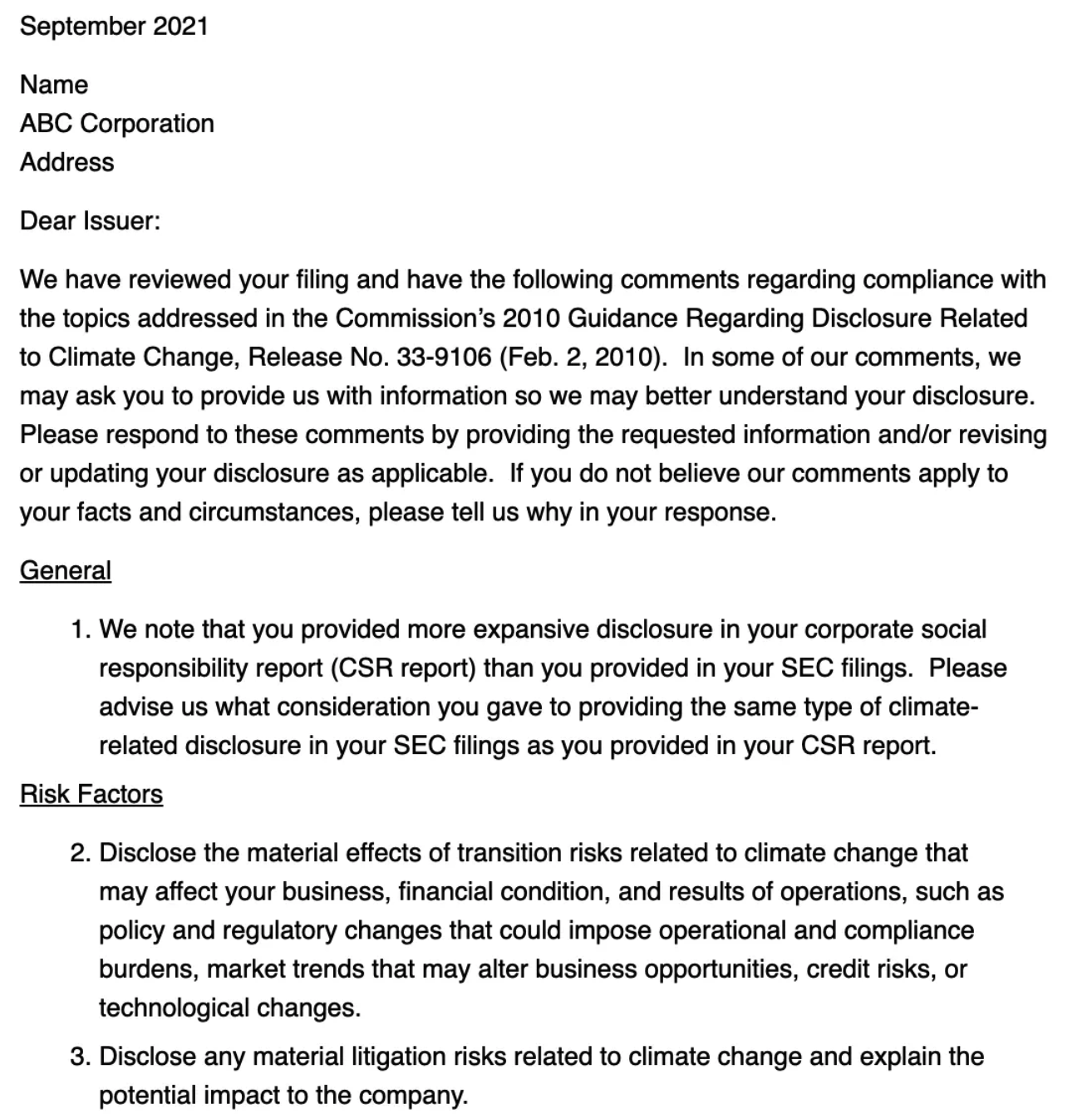I read the nearly 100 page Complaint, so you don’t have to — here’s the key takeaways that all ESG practitioners need to know.
Photo by Patrick Tomasso on Unsplash
As a lawyer and sustainability consultant, I spent a lot of time helping my clients understand and manage risk. One major risk that all businesses want to avoid: a lawsuit. More specifically, and for purposes of this article, an enforcement action brought by a regulatory agency.
As Environmental, Social and Governance, or ESG, is now the acronym du jour, business owners should be aware of the corresponding risks.
And I’ll be the first to say that ESG done correctly — meaning transparent and data driven reporting of material metrics — is an effective risk management strategy.
But don’t take my word for it, even insurance carriers see the risk-reduction benefits of a robust ESG strategy. Marsh insurance was one of the first to “recognize companies that take a proactive approach to managing ESG risks, potentially enabling them to secure enhanced terms and conditions in their directors and officers liability (D&O) insurance policies.”
So, what can we learn when ESG is done incorrectly, to drive better ESG reporting, financial decision-making and risk management?
The Securities and Exchange Commission
ESG done incorrectly, presents significant risks. And as regulators have stepped further into the ESG space, the risk of running afoul of regulations that relate to ESG reporting has increased. Earlier this year, the SEC issued proposed rules on The Enhancement and Standardization of Climate-Related Disclosures for Investors, which are currently open for public comment (until June 17, 2022).
In advance of these proposed rules, in March, 2021 the SEC announced the formation of the Climate and ESG Task Force in the Division of Enforcement. You can learn more about the Task Force, here. The Task Force was charged with identifying material gaps or misstatements in issuers’ ESG disclosures, and the SEC’s latest Complaint starts to reveal exactly what that means.
Securities and Exchange Commission v. Vale S.A.
The Task Force’s work recently resulted in the SEC’s filing of a Complaint against Vale S.A., a publicly traded Brazilian mining company (and one of the world’s largest iron ore producers), in United States District Court for the Eastern District of New York.
The Complaint is seventy-six pages in length and you can read the entire Complaint here. The Summary section provides an overview of the issues:
For purposes of what ESG Professionals can learn from this matter, we will focus on the 5th bullet, “false and misleading statements to investors.”
What lessons can we learn?
How can we use the information in the Complaint to be better ESG practitioners and manage the regulatory risks associated with ESG reporting?
The key allegations with respect to ESG reporting give some helpful insights:
The importance of good data
There is also numerous reminders in the Complaint regarding something all ESG professionals should understand: the importance of good data. The SEC’s Complaint contains multiple references to how many issues stemmed from reliance on flawed data, “purposeful use of unreliable data, rendering the resulting stability certifications false.” Para. 229 (many other references).
The importance of materiality
Note the number of references to “material” in the summary, above. Poor data problems are made even worse when inaccurate or incomplete data is used to report on issues that are material to investors:
The SEC is also increasingly scrutinizing a company’s own assessment of what is and is not material to investors. In 2021, the SEC released a sample letter followed by actual letters to various companies, asking them for, among other things, to specify what aspects they deem “material,” and explain why certain issues are not “material.”
Sample letter, https://www.sec.gov/corpfin/sample-letter-climate-change-disclosures
The Sample Letter goes on to request discussion or explanation of various topics, “if material” or “to the extent material.” The SEC’s recent activity, and the Vale Complaint, reinforce the importance of paying close attention to materiality. If you are going to claim that additional disclosures were not required because an issue is not “material” to investors, you need to have a solid foundation for that position.
The SEC will look at the totality of the circumstances
Additionally, the Vale Complaint really demonstrates that the SEC will look beyond the “four corners” of SEC filings, and consider all public-facing statements.
The Complaint specifically referenced not only SEC filings, but Sustainability Reports and even Webinars:
Vale’s webinar content was also considered by the SEC, which specifically called out an “ESG Webinar” published on Vale’s website.
The lesson is that it is that not just SEC filings that matter; related documents, and public-facing statements will, apparently, be considered by the SEC.
Corporate representatives will want to pay attention
The Vale Complaint also details what key Executives knew or should have known. If formalized into a final rule, the SEC’s proposed rules on The Enhancement and Standardization of Climate-Related Disclosures for Investors expand the scope of various disclosures. As such, Executives will want to pay even closer attention to all SEC disclosures, as well as the information in all public-facing documents (Sustainability and ESG reports, as explained above), which are incorporated into these disclosures by reference.
If we use Starbucks’ 2021 Form 10-K as an example, this is what key executives have to attest to:
As noted above, Executives would be wise to spend even more time reading and understanding not only the SEC forms, but also the related documents, including CSR and Sustainability reports, and webinars, before signing the attestation forms.
Key Takeaways
So what can we learn from the SEC’s latest Complaint? Here’s my top takeaways:
The importance of good data — this should be the bare minimum, starting point.
Materiality matters— companies need to be able to back up their position that an issue is not “material” to investors.
The SEC will look at the totality of the circumstances — ensure all publicly-facing statements — including websites and webinars — are grounded in data and not misleading.
Corporate representatives will want to pay even closer attention to all publicly-facing representations regarding Environmental, Social and Governance aspects — liability increases when these documents are incorporated by reference into SEC filings.











